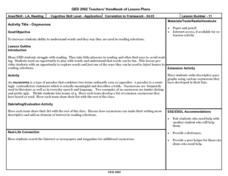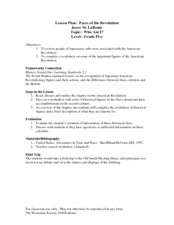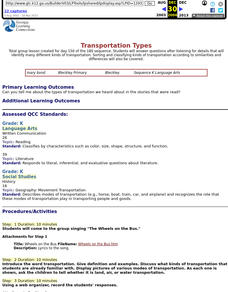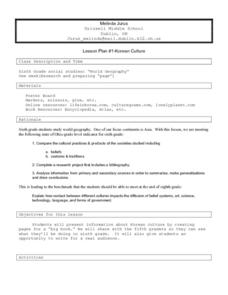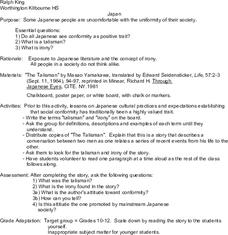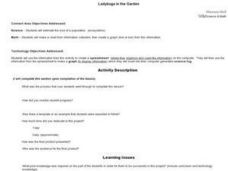Curated OER
Investigating the Technological Impacts on N.C.
Fourth graders search the internet to identify ways in which technology has influenced the lives of North Carolinians.
Curated OER
Oxymorons
Twelfth graders explore the use of oxymorons in everyday speech and writing. In small groups, 12th graders develop a list of common oxymorons they have heard or read to present to the class, and search the Internet for additional oxymorons.
Curated OER
Tree-Mendous!
Students classify trees. In this tree-mendous lesson, students categorize a variety of trees to assist them in playing a Jeopardy like game. Students identify new vocabulary terms and classify the uses and benefits of trees for humans.
Curated OER
Who's Who in the Pacific War
Middle schoolers investigate the historical figures of World War II that focuses on the fight in the South Pacific. They conduct research using a wide variety of resources. Students use the information to communicate a report in written...
Curated OER
Faces of the Revolution
Fifth graders investigate the important figures of the American Revolution. In this American Revolution activity, 5th graders outline the important events of the war and complete a worksheet.
Curated OER
Transportation Types
Students answer questions after listening for details that identify many different kinds of transportation.
Curated OER
My Heroes Picture Book
Students create picture books about family members and friends who are heroes.
Curated OER
Index Card Jigsaw
Students explore accomplishments of historical figures. Through participation in a hands-on activity, teams of students match names, quotes, views and political party affiliation to the correct picture. They create a chart from the...
Curated OER
Centennial: Simple Gifts...Personal Contributions To Utah
Fourth graders consider how the concept of giving can affect a society for the better. They read various essays on giving and examine obituaries to highlight individuals who contributed to society over the course of their lives.
Curated OER
In Your Opinion: Are Athletes Heroes?
Students identify athletes that could be classified as heroes. They participate in a debate in which they argue whether or not they should be classified as such. They are evaluated on how they work together and the information presented.
Curated OER
Korean Culture
Sixth graders complete a research project for the sixth grade Big Book that is to be shared with the 5th graders. Students should take their time because the project represents them and the whole class.
Curated OER
Basic Crypto Systems
Students try to solve codes mathematically. The use of a code needs a key. Students try to decipher a code with a mathematical key. This requires focus and higher order thinking skills like analysis.
Curated OER
What is a Republican Government?
Students engage in a problem-solving activity examining some of the considerations involved in determining common welfare in creating a republican government.
Curated OER
Graphs - On the Floor and Ask a Friend
Students create a floor graph and then interview their classmates to create their own graph.
Curated OER
Memories
Fifth graders collect artifacts of their fifth grade school year and make a technology based Memory Book.
Curated OER
The shop is important
Pupils consider where food comes from and how it gets to them. They identify where shops are found and visit one to investigate how it operates.
Curated OER
Where am I?
Students describe locations accurately, and draw a Brigham Young University campus map.
Curated OER
Japan
Students read the literature of The Talisman in order to make cultural connections and investigate the concept of irony and how it is used in this Japanese text. They also discuss the issue of conformity and its relationship to the story.
Curated OER
Should We Allow New Mining in the Upper Peninsula?
Students compose an essay taking a position on whether or not a proposed
mine near Marquette, MI should be opened. Students defend their position addressing relevant issues through factual supporting details. Their essay includes an...
Curated OER
Ladybugs in the Garden
Fifth graders estimate the size a population (ecosystems) Students make a chart from information collected then create a graph (line or bar) from this information. Students do a lesson where they observed, examine, and record data...
Curated OER
Storytelling
Pupils explore, as a basis for their poem, their own personal observations and understandings of a specific person's character which might include exploits, actions, mannerisms and personality. They write a brief poem that tells a story.
Curated OER
The Water Cycle
First graders investigate the different stages of the water cycle. They conduct Internet research and complete a water cycle WebQuest. Students identify what happens at each stage of the water cycle, and write about each stage in their...
Curated OER
Centennial: But Mom, I Have Nothing To Wear
Fourth graders examine the contributions of Native American Indians, explorers, and Utah's pioneers. They discuss ways in which clothing can communicate and help identify time periods, thoughts, and values.
Curated OER
Using Scholastic News to Introduce the Net
Third graders log on to the net, type in the address for Scholastic and browse the subjects for the week. They select one area of interest and generate five interesting facts about the article.



